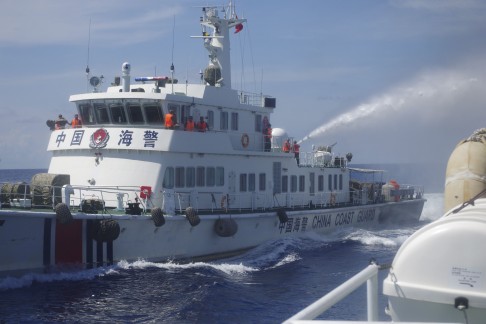Looming street protests over China a test for Vietnam
Anger over an oil rig deployed by Beijing in a disputed area of the South China Sea drives rare public demonstrations in Vietnam
PUBLISHED : Saturday, 10 May, 2014, 2:04pm
UPDATED : Saturday, 10 May, 2014, 4:59pm
Associated Press in Hanoi

Protesters shout as they hold an anti-China banner which reads, "down with China" at a park in front of Chinese embassy in Hanoi on Friday. Photo: Reuters
Vietnamese anger toward China is running at its highest level in years after Beijing deployed an oil rig in disputed waters. That’s posing a tricky question for Vietnam’s leaders: To what extent should they allow public protests that could morph into those against their own authoritarian rule?
At one level, the ruling Communist Party would like to harness the anger on the street to amplify its own indignation against China and garner international sympathy as naval ships from both countries engage in a tense stand-off near the rig off the Paracel Islands in the South China Sea.
But Vietnam’s government instinctively distrusts public gatherings of any sort, much less ones that risk posing a threat to public order. And they also know that members of the country’s dissident movement are firmly embedded inside the anti-China one, and have used the issue to mobilize support in the past.
The two Asian nations have a history of conflict going back 1,000 years, and the streets of Vietnam’s cities are named after heroes in those fights. In the more recent past, the navies have twice had deadly engagements in the South China Sea. There was a brief but bloody border war in 1979. All have a created a deep well of mistrust toward China among ordinary Vietnamese.
Yet the two countries share a Communist ideology and close economic ties, making the China-Vietnam relationship highly sensitive topic. The latest round of tension — the worst since 1988, when 64 Vietnamese sailors were killed in a clash with the Chinese navy — had led to fresh and awkward questions over that relationship, a normally taboo topic in the state-controlled media.
“It’s time for the Communist Party of Vietnam to reconsider all its policy toward Beijing ... Vietnam should immediately abandon Beijing as an economic and a political model,” Huy Duc, one of Vietnam’s best known bloggers wrote in a recent post. “Hopefully, the drilling rig 981 incident will awaken the Communist Party of Vietnam to be on the side of the people and drive out the Beijing expansionists.”

A Chinese ship uses water cannon on a Vietnamese Sea Guard ship on the South China Sea near the Paracels islands. Photo: Reuters
The first test for the government looks set to be this weekend. A statement widely circulated on Facebook and dissident blogs called for protests on Sunday morning in Hanoi outside the Chinese Embassy and a Chinese cultural centre in Ho Chi Minh City. In past years, authorities have only allowed anti-China demonstrators to walk around a lake in downtown Hanoi.
“Facing the danger of Chinese aggression appropriating the sacred East Sea, the source of livelihood of the Vietnamese over generations, we are determined not to compromise,” according to a statement posted alongside the protest call that used the Vietnamese term for the South China Sea.
“We cannot continue to compromise and be vile and sinful to our heroic ancestors and feel ashamed before our future generations,” it said.
The last time there was a flare-up in the South China Sea in 2011, anti-Chinese protests lasted weeks, and some protesters voiced slogans against the government. Authorities used force to break them up.
“The state is in a truly difficult position,” said Jonathon London, an expert on Vietnam at Hong Kong’s City University. “By expressing its stern objections to China, it also invites expressions of dissent from Vietnamese that can take multiple forms. Certainly there is some overlap between those who want to express their anger at China, and those who are calling for basic reforms.”
Vietnam’s first response to the rig’s deployment close to the Paracel Islands was to send ships to try and stop the rig from starting drilling, and demand Beijing withdraw. Each side accuses the other of ramming their boats. China has said it is staying put and called on Vietnam to pull back its ships.
Vietnam now finds itself pleading its case internationally but without any kind of solid alliance with a powerful country that that might make China listen more carefully. It can’t afford to do anything that would severely rupture ties with Beijing because it is the country’s largest trading partner.
That argument doesn’t wash with everyone, however.
“You can’t use the importance of the relationship as an excuse not to do anything,” said Nguyen Quang A, a respected academic who has been a frequent attendee of anti-China protests in the past. “I think what they did with sending the coast guard vessels was OK, but they have to be much stronger on the diplomatic and legal field.”
China has announced the rig will stay in the area until August, meaning tensions are likely to remain until then.
Experts say the incident might push Vietnam closer to the Philippines, which also is engaged in territorial disputes with China, or toward the United States, which wants closer ties with Vietnam as part of its efforts to counter Chinese influence in Asia.
Last year, the Philippines filed a case against the Chinese claim at a UN tribunal, to the displeasure of Beijing. Many analysts believe that Vietnam will now be seriously considering filing its own appeal or joining Manila, opening a diplomatic and legal front against Beijing.
“That’s the one arrow left in their quiver other than shooting,” said David Brown, a former US diplomat and Vietnam observer.

